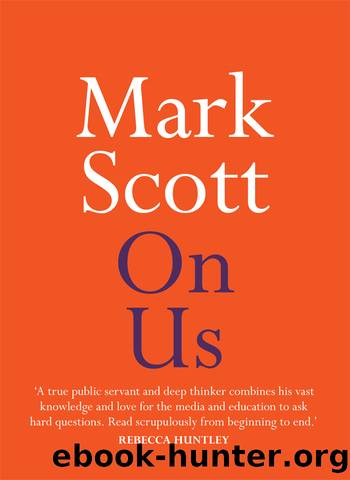On Us by Mark Scott

Author:Mark Scott [Scott, Mark]
Language: eng
Format: epub
Publisher: Melbourne University Publishing
This is not just the view of sceptical journalists. One critic snagged my attention when he told a privacy conference that tech companies were taking personal information and weaponising it against us with military efficiency, with scraps of dataâeach harmless enough on its ownâbeing assembled, synthesised, traded and sold. Profiles are run through algorithms, which serves up increasingly extreme content that pounds our harmless preferences into hardened convictions. And who was the critic? The man who sells the screens and hosts the apps that steal our time and shape our minds. Appleâs CEO, Tim Cook.
Tech firms talk about engagement, but so many of us know this really means addiction. It seems a harsh word, addiction. I look up a simple definition: âa physical or psychological need to do, take or use something, to the point where it could be harmful to youâ. And as the early creators of the sites have freely admitted, they were designed using the same psychological insights that had so successfully driven addiction to things such as poker machines. Itâs a world we didnât know we wanted. All this new digital content fills up Infinity Pools: the apps and other sources of endlessly replenishing content. Two former Google execs, Jake Knapp and John Zeratsky, coined the term and explain it simply. âIf you can pull to refresh, itâs an Infinity Pool. If it streams, itâs an Infinity Pool.â A world always available; a place designed so you could get lost in it forever.
And there is something about negative emotions that means, in an online setting, they seem much more powerful in grabbing our attention, in driving a reaction, in keeping us compelled and clicking. It can be ugly, but it is hard to look away. Negative emotions spiked by algorithms inciting us, âbad actorsâ seducing us, fellow citizens abusing us.
I remember that back when I was working at the SMH, the letters pages were always a wonderful showcase of the readersâ wit and intelligence. When I started, they all seemed to arrive in the mailbag, although a few may have been faxed through to us. But there was something about having to write a letter, and address an envelope, and find a stamp and then post it, that seemed to provide breaks on the intemperate or splenetic. Once email arrived, the tone of the correspondence changed quickly and markedly. The wonderful letters were still there, but they were buried beneath a torrent of fury or abuse. It was just so easy to press âsendâ; an early sign of the unleashed trolls, who would soon be abundant in the online world.
If you are not a target of such sexist, racist or abusive online attacks, it can be a surprise to learn of this stuff if it hasnât popped up in your feed. I did a panel about Twitter at the ABC, with Annabel Crabb and Mia Freedman, just as the site was beginning to generate a lot of attention. When questioned about trolls and hate speech, I
Download
This site does not store any files on its server. We only index and link to content provided by other sites. Please contact the content providers to delete copyright contents if any and email us, we'll remove relevant links or contents immediately.
american english file 1 student book 3rd edition by Unknown(609)
Phoenicians among Others: Why Migrants Mattered in the Ancient Mediterranean by Denise Demetriou(608)
Verus Israel: Study of the Relations Between Christians and Jews in the Roman Empire, AD 135-425 by Marcel Simon(595)
Caesar Rules: The Emperor in the Changing Roman World (c. 50 BC â AD 565) by Olivier Hekster(580)
Basic japanese A grammar and workbook by Unknown(575)
Europe, Strategy and Armed Forces by Sven Biscop Jo Coelmont(520)
Give Me Liberty, Seventh Edition by Foner Eric & DuVal Kathleen & McGirr Lisa(499)
Banned in the U.S.A. : A Reference Guide to Book Censorship in Schools and Public Libraries by Herbert N. Foerstel(492)
The Roman World 44 BC-AD 180 by Martin Goodman(478)
Reading Colonial Japan by Mason Michele;Lee Helen;(469)
DS001-THE MAN OF BRONZE by J.R.A(462)
The Dangerous Life and Ideas of Diogenes the Cynic by Jean-Manuel Roubineau(456)
Introducing Christian Ethics by Samuel Wells and Ben Quash with Rebekah Eklund(456)
Imperial Rome AD 193 - 284 by Ando Clifford(454)
The Oxford History of World War II by Richard Overy(454)
Catiline by Henrik Ibsen--Delphi Classics (Illustrated) by Henrik Ibsen(427)
Language Hacking Mandarin by Benny Lewis & Dr. Licheng Gu(411)
Literary Mathematics by Michael Gavin;(407)
Brand by Henrik Ibsen--Delphi Classics (Illustrated) by Henrik Ibsen(390)
